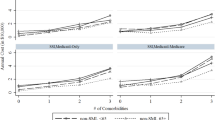Abstract
According to the US Department of Health and Human Services, 91 million adults live in mental health professional shortage areas and 10 million individuals have serious mental illness (SMI). This study examines how the supply of psychiatrists, severity of mental illness, out-of-pocket costs, and health insurance type influence patients’ decisions to receive treatment and the type of provider chosen. Analyses using 2012–2013 MarketScan Commercial Claims data showed that patients residing in an area with few psychiatrists per capita had a higher predicted probability of not receiving follow-up care (46.4%) compared with patients residing in an area with more psychiatrists per capita (42.5%), and those in low-psychiatrist-supply areas had a higher predicted probability of receiving prescription medication only (10.2 vs 7.6%). Patients with SMI were more likely than those without SMI to obtain treatment. A $25 increase in out-of-pocket costs had marginal impact on patients’ treatment choices.

Similar content being viewed by others
References
Substance Abuse and Mental Health Services Administration. Results from the 2013 National Survey on Drug Use and Health: Mental Health Findings. NSDUH Series H-49, HHS Publication No. SMA 14–4887, Rockville, MD: Center for Behavioral Health Statistics and Quality, 2014.
Substance Abuse and Mental Health Services Administration. Report to Congress on the Nation’s Substance Abuse and Mental Health Workforce Issues. Rockville, MD: Substance Abuse and Mental Health Services Adminsitration, 2013.
Ljungberg A, Denhov A, Topor A. The art of helpful relationships with professionals: a meta-ethnography of the perspective of persons with severe mental illness. Psychiatric Quarterly. 2015;86(4):471–495.
Lawrence D, Kisely S. Inequalities in healthcare provision for people with severe mental illness. Journal of Psychopharmacology. 2010;24(4 supplement):61–68.
Marshall M, Lewis S, Lockwood A, et al. Association Between Duration of Untreated Psychosis and Outcome in Cohorts of First-Episode Patients: A Systematic Review. Arch Gen Psychiatry. 2005;62(9):975–983. https://doi.org/10.1001/archpsyc.62.9.975
McLaughlin, C. Delays in treatment for mental disorders and health insurance coverage. Health Services Research. 2004;39(2):221–224.
Vallon KR, Foti ME, Langman-Dorwart N, et al. Comprehensive case management in the private sector for patients with severe mental illness. Psychiatric Services. 1997;48(7):910–914.
Fleischhacker WW, Arango C, Paul Arteel, et al. Schizophrenia—time to commit to policy change. Schizophrenia Bulletin. 2014;40(Suppl 3): S165-S194.
ten Have M, de Graaf R, van Dorsselaer S, et al. Lifetime treatment contact and delay in treatment seeking after first onset of a mental disorder. Psychiatric Services. 2013;64(10):981–989.
Mickus M, Colenda CC, Hogan AJ. Knowledge of mental health benefits and preferences for type of mental health providers among the general public. Psychiatric Services. 2000;51(2):199–202.
Stewart TJ, Swift JK, Freitas-Murrell BN, et al. Preferences for mental health treatment options among Alaska Native college students. American Indian and Alaska Native Mental Health Research. 2013;20(3):59–78.
Bishop TF, Press MJ, Keyhani S, et al. Acceptance of insurance by psychiatrists and the implications for access to mental health care. JAMA Psychiatry. 2014;71(2):176–181.
Horgan CM, Merrick EL, Stewart MT, et al. Improving medication management of depression in health plans. Psychiatric Services. 2008;59(1):72–77.
Thattle S, Makinen JA, Nguyen HN. Partial hospitalization for youth with psychiatric disorders: treatment outcomes and 3-month follow-up. The Journal of Nervous and Mental Disease. 2013;201(5):429–434.
Heisler E, Bagalman E. The Mental Health Workforce: A Primer. Congressional Research Service, 2015.
Area Health Resources Files. Bethesda, MD: Health Resources and Services Administration, 2014–2015. Available online at http://ahrf.hrsa.gov/. Accessed February 20, 2017.
RTI International. Defining Mental Health and/or Substance Abuse (MH/SA) Claimants: The Medicare, Medicaid and Managed Care Analysis Project. Research Triangle Park, NC: RIT International, 2003.
Drake RE, Mueser KT, Brunette MF. Management of persons with co-occurring severe mental illness and substance use disorder: program implications. World Psychiatry. 2007;6(3):131–136.
Heiss F. Specification(s) of Nested Logit Models. Mannheim, Germany: University of Mannheim, 2002.
McFadden D. Conditional logit analysis of qualitative choice behaviour. In: P Zarembka (Ed). Frontiers in Econometrics. New York: Academic Press, 1974, pp. 104–142.
Cameron A, Trivedi P. Microeconomics Using Stata. College Station, TX: Stata Press, 2010, p. 515.
Kyanko KA, Curry LA, Busch SH. Out-of-network provider use more likely in mental health than general health care among privately insured. Medical Care. 2013;51(8):699–705.
Stein BD, Meili R, Tanielian TL, et al. Outpatient mental health utilization among commercially insured individuals: in- and out-of-network care. Medical Care. 2007;45(2):183–186.
Kyanko KA, Curry LA, Busch SH. Out-of-network physicians: how prevalent are involuntary use and cost transparency? Health Services Research. 2013;48(3):1154–1172.
McGinty EE, Busch SH, Stuart EA, et al. Federal parity law associated with increased probability of using out-of-network substance use disorder treatment services. Health Affairs (Millwood). 2015;(34)8:1331–1339.
Jagdeo A, Cox BJ, Stein MB, et al. Negative attitudes toward help seeking for mental illness in 2 population-based surveys from the United States and Canada. Canadian Journal of Psychiatry. 2009;54(11):757–766.
Corrigan PW, Druss BG, Perlick DA, et al. The impact of mental illness stigma on seeking and participating in mental health care. Psychological Science in the Public Interest. 2014;15(2):37–70.
Ali MM, Teich JL, Mutter, R. The role of perceived need and health insurance in substance abuse treatment: implications for the Affordable Care Act. Journal of Substance Abuse Treatment. 2015;54:14–20.
Vera M, Alegria M, Freeman DH Jr, et al. Help seeking for mental health care among poor Puerto Ricans: problem recognition, service use, and type of provider. Medical Care. 1998;36(7):1047–1056.
Cheng TC, Lo CC. Domestic violence and treatment seeking: a longitudinal study of low-income women and mental health/substance abuse care. International Journal of Health Services. 2014;44(4):735–759.
Hodgkinson S, Godoy L, Beers LS, et al. Improving mental health access for low-income children and families in the primary care setting. Pediatrics. 2017;139(1):e20151175.
Gadomski A, Wissow LS, Slade E, et al. Training clinicians in mental health communication skills: impact on primary care utilization. Academic Pediatrics. 2010;10(5):346–352.
Narrow WE, Regier DA, Norquist G, et al. Mental health service use by Americans with severe mental illnesses. Social Psychiatry and Psychiatric Epidemiology. 2000;35(4):147–155.
Simon GE, VonKorff M. Recognition, management, and outcomes of depression in primary care. Archives of family medicine. 1995 Feb 1;4(2):99.
Pincus HA, Pechura CM, Elinson L, et al. Depression in primary care: linking clinical and systems strategies. General Hospital Psychiatry. 2001 Dec 31;23(6):311–8.
Mark T., Olesiuk WJ, Sherman LJ, et al. Effects of the 2013 Psychiatric Current Procedural Terminology Codes Revision on Psychotherapy in Psychiatric Billing. Psychiatric Services in Advance 2017, August 15; https://doi.org/10.1176/appi.ps.201700031
T. Mark, W. Olesiuk, Ali, MM, et al. Differential Reimbursement of Psychiatric Services by Psychiatrists and Other Medical Providers. Psychiatric Services. 2017; forthcoming.
Acknowledgements
The views expressed in this article are those of the authors and do not necessarily represent those of the Substance Abuse and Mental Health Services Administration (SAMHSA) or the US Department of Health and Human Services (DHHS). Truven Health Analytics would like to acknowledge the methodological expertise given by Daniel S. Levy, PhD and Joffre Swait, PhD. We also thank Linda Lee, PhD for editorial review.
Funding
This work was funded by the Substance Abuse and Mental Health Services Administration.
Author information
Authors and Affiliations
Corresponding author
Ethics declarations
Conflict of Interest
The authors declare that they have no conflict of interest.
Rights and permissions
About this article
Cite this article
Jones, J.M., Ali, M.M., Mutter, R. et al. Factors that Affect Choice of Mental Health Provider and Receipt of Outpatient Mental Health Treatment. J Behav Health Serv Res 45, 614–626 (2018). https://doi.org/10.1007/s11414-017-9575-6
Published:
Issue Date:
DOI: https://doi.org/10.1007/s11414-017-9575-6




